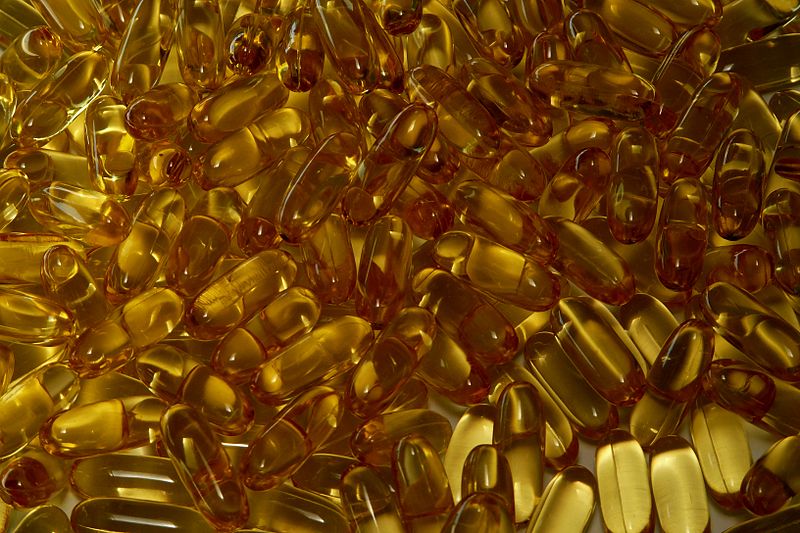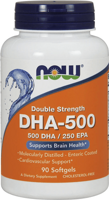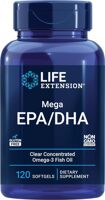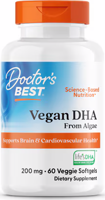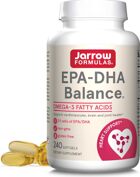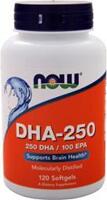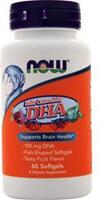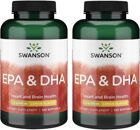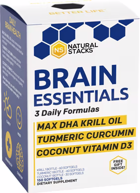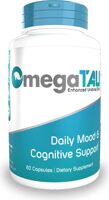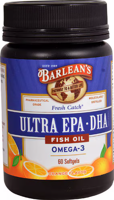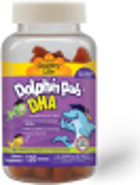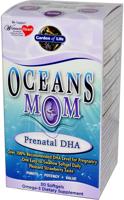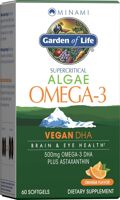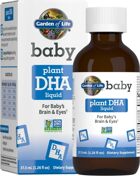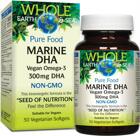DHA (Docosahexaenoic acid) is a crucial omega-3, polyunsaturated fatty acid. Its importance for human biology cannot be understated.
Biological functions
Comprising 40% of the human brain's polyunsaturated fats, and 60% of the retina's, DHA is essential for neuronal development and the maintenance of proper brain function. In fact, reduced blood plasma omega-3 levels are found in Alzheimer's disease, Parkinson's disease, ADHD, and depression.
These discoveries have catalyzed a massive interest in omega-3 within the scientific community. Several studies suggest that supplementation of these good fats can improve your health and protect you from disease in the future.
The most common source of DHA comes from fish -- or fish oil -- which contains EPA, DHA, DPA, and ALA, usually in concentration of this sequential order.
This article will focus on the function of DHA in the human body and the benefits afforded by adding DHA to your daily diet.
Supplementation benefits
This article focuses on the benefits of supplemental DHA for adults in general. (By the way, recent evidence suggests that pregnant women consume an average of 80mg per day, while the FDA suggests a minimum of 300mg per day).
Cancer prevention
Research demonstrates that reduced DHA intake correlates with an increased risk of various cancers, and supplementation may reduce your susceptibility to cancer.
Endometrial cancer
This is the fourth most common cancer among women. A study published in 2012 by researchers at the Yale School of Public Health found that women with high intake of DHA have a 36% reduced risk of endometrial cancer compared to women with low intakes. And consumption of fish is not required for benefits. "Fish oil supplement usage was associated with significantly lower risks of endometrial cancer ranging from 26% to 48% lower."[1]
Liver cancer
A 2012 Japanese study concluded, "those in the highest quintiles with respect to intakes of EPA, DPA and DHA exhibited lowered risks of liver cancer by 44%, 36%, and 29%."[2]
Breast cancer
In a massive study of more than 35,000 post-menopausal women, regular consumption of fish oil containing DHA and EPA "was associated with a 32% reduction in breast cancer as compared to non-users."[3]
Improved cognition
Though formerly thought to be important primarily for brain development, DHA is proven to enhance aspects of cognition for all ages.
Cognition
Infant intelligence
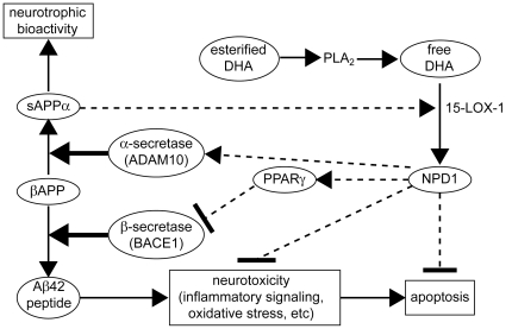
DHA May Help Improve Focus
Infants fed a baby formula containing DHA showed significantly higher IQ scores. "The children in the control group received an average MDI score of 98 -- slightly below the national average of 100 for U.S. children. The DHA group received an average score of 102.4, and the DHA plus AA group received an average score of 105."[4]
Enhanced memory
A memory study analyzed the effects of a DHA-rich supplement versus placebo on 176 healthy adults, ages 18 to 45. After six months, researchers subjected participants to a battery of memory tests. Among the DHA group, significant improvements were found with reaction time, episodic memory, and working memory.[5]
Dementia
A high dietary intake of DHA is associated with a considerably reduced prevalence of dementia, "and a significantly reduced risk of having Alzheimer's disease."[6]
Cardiovascular health
DHA supplementation (usually combined with EPA) can be extremely beneficial to the cardiovascular system by:
- Reducing blood pressure
- Lowering triglyceride levels
- Lowering stroke risk
- Improving heart surgery outcomes
- Improving exercise capacity
- Reducing all-cause mortality
Fitness
omega-3 fatty acids (containing DHA) can improve the desirable outcomes of exercise.
Muscle synthesis
In one study, DHA supplementation (along with EPA) dramatically increased muscle synthesis in an elderly population (average age, 71 years) via a "significantly increased...response to amino acid and insulin infusion such that the fractional muscle protein synthesis rate was increased by 71%."
The researchers went on to conclude that, although perhaps not as intensely, similar effects could be expected for persons of any age.[12]
Improved body composition and disease risk factors
After aerobic exercise, fish oil supplementation has been shown to, "reduce fasting blood plasma triglyceride levels by 14% overall in contrast to the control (sunflower oil) groups where no such lowering was observed," and confer 4% more fat loss than control groups.[13]
Mental health
Though this section is more controversial, preliminary and human trials have shown reduced levels of DHA in persons with depression, dementia, psychosis, anger, and ADHD. The results of supplementation have been conflicting and incomplete, with some suggesting benefits and others showing little benefit compared to control groups. Obviously, this is a subject that demands more research.
How DHA works in the brain
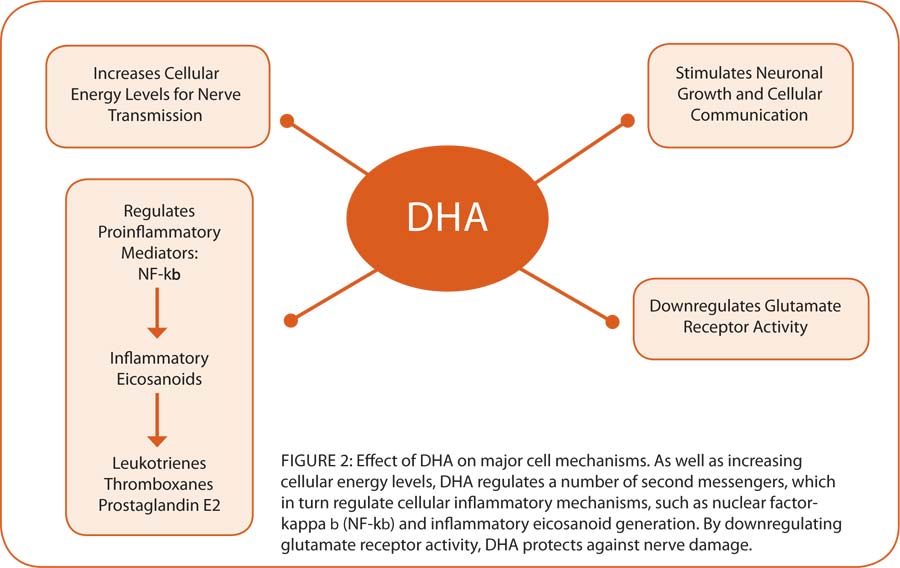
How it works in the brain
Every cell in your body is contained within a wall of lipid molecules (fat) punctuated with functional proteins, otherwise known as the lipid bilayer. This system provides control over what enters and exits (endocytosis and exocytosis) the cell, and permits communication with other cells. When unsaturated fats compose the lipid bilayer, the cell becomes more permeable, allowing nutrients, oxygen, hormones, and many other molecules to more readily enter the cell.
In the brain, communication is key. DHA, the primary unsaturated fat in the nervous system, is essential for allowing neurons within the brain to communicate, accept communications, and receive necessary nutrients.
It's important to understand that this cellular exterior is very fluid, moving and interchanging lipids constantly. So, in theory, if we maintain a healthy ratio of unsaturated fats, these cells will communicate more efficiently (due to the constant supply of good fat), resulting in a healthier brain.
Also, a permeable cell membrane allows the cell to more efficiently remove waste products, such as advanced glycation end-products (AGEs) and amyloid proteins (implicated in Alzheimer's disease). In fact, there's evidence that diets rich in saturated fats are correlated with an increased risk for Alzheimer's disease.[19]
Why we need it
In the human body, DHA is also synthesized from consumption of alpha linoleic acid (ALA is a common short-chain fatty acid derived from plant fats and animals). But synthesis is paltry at best.[21]
The average American diet is deficient in DHA, so unless you eat fish on a daily basis, you're likely depriving your body of this essential fat.
For a period of time, essential fatty acids, such as DHA, were classified as vitamin F. But since they're required in massive quantities, they were discarded from this nomenclature. Regardless, think of DHA as an essential vitamin -- one that the average American is severely lacking.
ALA is a great omega-3 supplement with its own effects, but if you are on a budget and forced to choose only one essential fatty acid, it should be the Docosahexaenoic acid based products on this page. End of story.
Recommended dosage
For the purpose of optimal health and cardiovascular maintenance, the suggested daily consumption for DHA and EPA should be at least .3% of total energy for a 2000-calorie diet. That's about 220mg per day of DHA. Many human studies use upwards of 200mg per day with no apparent ill effect.
An average serving of cold water oily fish contains anywhere from 200mg to 2000mg of omega-3 fatty acids, with approximately half being DHA. So there's little cause for concern with ingesting large quantities of DHA.[14, 15]
According to the FDA, up to 3000mg per day of DHA/EPA from all sources (diet and supplements) is generally considered safe for most adults.[17]
Food-based sources
The fish most with the highest concentrations of DHA are listed below:
- Salmon
- Krill
- Bluefin or White albacore tuna
- Swordfish
- Anchovies, Herring, and Sardines
- Caviar
Additional non-fish based sources include:
- Algae (the common source for strict vegetarians)
- Mother's breastmilk (for infants)
As always, these statements have not been approved by the Food and Drug Administration, does not constitute medical advice and you should always consult your doctor before starting a new supplement, drug, or exercise regimen.
Side effects and drug interactions
Use caution if you're prescribed blood-thinning medications, such as aspirin or warfarin. Fish oil interferes with blood clotting and could enhance the effects.
Fish, along with fish oil (the main source of DHA), is susceptible to the accumulation of heavy metals and fat-soluble pollutants. Ensure that you are taking a quality supplement that indicates proper purification methods.
As an alternative (though generally more expensive), newer omega-3 supplements produced from micro-algae oil have a lower risk of pollutant exposure.[18]
Where to buy
On this page, we show price comparisons for supplements that are marketed as high-DHA products. Due to its importance, we typically recommend you stick with the products suggested here. If you want an all-around omega-3 product, however, see our omega-3 page, which will have several products that may have higher quantities of EPA.
We also have a separate fish oil page. Fish oil is a relatively vague term, however. It's important to see the specific dosages of fatty acids to ensure that you're getting a quality product rather than low-quality oil extracted from any random fish.
Stacking DHA
Cognitive and Athletic Performance

For cognitive enhancement, DHA will stack with nearly anything. Many people claim that it (along with EPA) can synergize by increasing the potency of nootropics -- products that help improve brain performance and focus.
Aspirin
For cardiovascular health, one very interesting stack is combining fish oil (containing DHA) with a low-dose aspirin, possibly multiplying the protective effects of both on their own. This stack relies on reducing pro-inflammatory prostaglandin synthesis with aspirin, and promoting the less inflammatory synthesis with fish oil.
As little as 20mg to 30mg per day of aspirin is suggested. The best approach is to consume 1/4 of a baby aspirin tablet along with regular fish oil supplementation.[20]
Once again, we are not doctors. These recommendations have not been approved by the FDA. You must speak with your doctor and get written consent before making changes to your supplementation regimen.
References
- Arem, H. et al.; DHA, EPA, Omega-3 Institute; European Journal of Nutrition; "Higher Intakes of DHA/EPA and Supplement Use and Lower Risk of Endometrial Cancer;" 2012
- Sawada, N. et al.; DHA, EPA, Omega-3 Institute; Gastroenterology; "Higher Intakes of Long-Chain Omega-3 Fatty Acids and Reduced Incidence of Liver Cancer;" 2012
- Brasky,T. M. et al.; Cancer Epidemiology, Biomarkers and Prevention; Fish Oil Supplementation Use and Reduced Breast Cancer Risk
- The Franklin Institute; "Nourish - Fats;"
- Stonehouse W, et al., American Journal of Clinical Nutrition; "DHA Supplementation Improves Memory in Young Adults;" 2013
- Lopez, L. B, et al.; Journal of Nutrition, Health and Aging; "Higher DHA Intakes and Blood Levels Associated with Lower Risk of Dementia in Older Adults;" 2011
- Schuchardt , J. P. et al., Prostaglandins, Leukotrienes, and Essential Fatty Acids; "Moderate Doses of EPA and DHA from Re-esterified Triacylglycerols but not from Ethyl-Esters Lower Fasting Triacylglycerols in Statin-Treated Dyslipidemic Subjects: Results from a Six Month Randomized Controlled Trial;" 2011
- de Goede , J. et al., PLoS One; Gender-Specific Associations of Marine n-3 Fatty Acids and Fish Consumption with 10-Year Incidence of Stroke;" 2012
- Farquharson AL, et. al.; "Effect of Dietary Fish Oil on Atrial Fibrillation after Cardiac Surgery;" 2011
- Nodari S, et. al.; Journal of the American College of Cardiology; Effects of n-3 Polyunsaturated Fatty Acids on Left Ventricular Function and Functional Capacity in Patients with Dilated Cardiomyopathy;" 2011
- Mozaffarian D., et. al.; Annals of Internal Medicine; Plasma Phospholipid Long-Chain Omega-3 Fatty Acids and Total and Cause-Specific Mortality in Older Adults https://www.dhaomega3.org/Cardiovascular-Health/Higher-Blood-Levels-of-Omega-3-Associated-with-Reduced-Mortality
- Smith GI, et. al.; Dietary Omega-3 Fatty Acid Supplementation Increases the Rate of Muscle Protein Synthesis in Older Adults: a Randomized Controlled Trial;" 2011
- Hill AM, et. al.; American Journal of Clinical Nutrition; Combining fish-oil supplements with regular aerobic exercise improves body composition and cardiovascular disease risk factors;" 2007
- American Heart Association; "Fish and Omega-3 Fatty Acids"
- Simopoulos, A.P., et al. Essentiality of recommended dietary intakes for omega-6 and omega-3 fatty acids. Ann. Nutr. Metab. 43: 127-30, 1999.
- Mayo Clinic; "Omega-3 Fatty Acids, Fish Oil, Alpha-Linolenic Acid; Updated 2012
- DHA, EPA, Omega-3 Institute; "Can you overdose on DHA and EPA?"
- Doughman SD, et. al.; "Omega-3 fatty acids for nutrition and medicine: considering microalgae oil as a vegetarian source of EPA and DHA;" 2007
- Dennis Thompson; WebMD; "Saturated Fat May Make the Brain Vulnerable to Alzheimer's Risk"
- Dr. McDougall's Health and Medical Center; "Heart Disease Prevention, Aspirin & Fish Oil"
- Gerster, H; "Can adults adequately convert alpha-linolenic acid (18:3n-3) to eicosapentaenoic acid (20:5n-3) and docosahexaenoic acid (22:6n-3)?"; Int J Vitam Nutr Res.; 1998.
DHA News on PricePlow
-
Apr 12, 2025 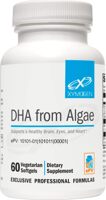
Product News
Xymogen DHA from Algae was created.
Category: DHA -
Apr 04, 2025 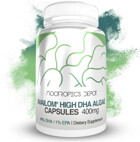
Product News
Nootropics Depot AvailOm DHA Algae has new variations: Category: DHA -
Apr 04, 2025 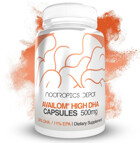
Product News
Nootropics Depot AvailOM High DHA was created.
Categories: DHA, EPA -
Apr 02, 2025 
Product News
Nootropics Depot AvailOm DHA Algae was created.
Category: DHA -
Mar 04, 2025 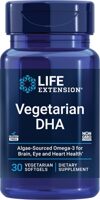
Product News
Life Extension Vegetarian DHA was created.
Category: DHA -
Jan 27, 2025 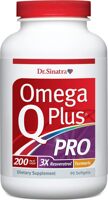
Product News
Dr. Sinatra Omega Q plus PRO was created.
Categories: CoQ10, DHA, EPA, Trans Resveratrol, Turmeric -
Jan 27, 2025 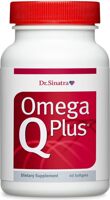
Product News
Dr. Sinatra Omega Q Plus has new variations: Categories: CoQ10, DHA, EPA, Resveratrol -
Jan 27, 2025 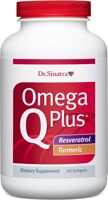
Product News
Dr. Sinatra Omega Q Plus Resveratrol Turmeric was created.
Categories: DHA, EPA, Trans Resveratrol, Turmeric -
Jan 27, 2025 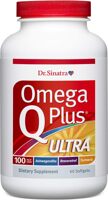
Product News
Dr. Sinatra Omega Q Plus Ultra was created.
Categories: Ashwagandha, CoQ10, DHA, EPA -
Jan 27, 2025 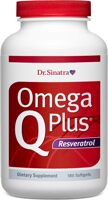
Product News
Dr. Sinatra Omega Q Plus Resveratrol was created.
Categories: DHA, EPA, Omega-3, Resveratrol -
Jan 27, 2025 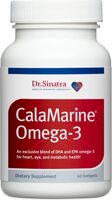
Product News
Dr. Sinatra CalaMarine Omega-3 was created.
Categories: DHA, EPA, Omega-3 -
Jan 26, 2025 
Product News
Dr. Sinatra Omega Q Plus was created.
Categories: CoQ10, DHA, EPA, Resveratrol -
Dec 18, 2024 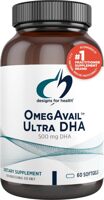
Product News
Designs For Health OmegAvail Ultra DHA was created.
Category: DHA -
Sep 28, 2024 
Product News
Nordic Naturals baby’s DHA has new variations: Categories: Children's Omegas, DHA -
Jul 06, 2024 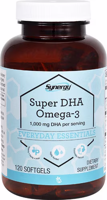
Product News
Vitacost Synergy - Super DHA Omega-3 was created.
Category: DHA -
Jul 05, 2024 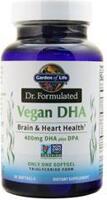
Product News
Garden of Life Dr. Formulated Vegan DHA was created.
Category: DHA -
Jun 16, 2024 
Product News
Nordic Naturals baby’s DHA has new variations: Categories: Children's Omegas, DHA -
Jun 12, 2024 
Product News
Deva Nutrition Vegan Omega-3 DHA-EPA has new variations: Category: DHA -
Jun 09, 2024 
Product News
Nordic Naturals baby’s DHA was created.
Categories: Children's Omegas, DHA -
May 25, 2024 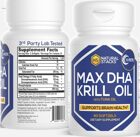
Product News
Natural Stacks Max DHA Krill Oil was created.
Categories: DHA, Krill Oil -
May 03, 2024 
YouTube Video
Animal OMEGA Updated: Less Capsules, More DHA -
Dec 23, 2023 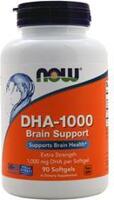
Product News
NOW DHA-1000 was created.
Category: DHA -
Jun 16, 2023 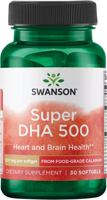
Product News
Swanson Super DHA 500 was created.
Category: DHA -
Apr 07, 2022 
YouTube Video
MAKE OMEGAS ACTUALLY WORK | SmartPrime-Om by NutraShure (Dr. Hector Lopez) -
Sep 14, 2016 
Blog Post
The 2016 FDA NDI Draft Guidance Document: How To Destroy The ENTIRE Dietary Supplement Industry in 102 Pages
The FDA's 2016 NDI Draft Guidance looks like the beginning of a multi-pronged attack on the dietary supplement industry. Read and fight this ASAP! -
Dec 30, 2015 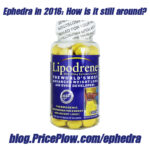
Blog Post
Ephedra Fat Burners in the 2020s: How are they still around?
Ephedra pills are still around -- How is that possible? Weren't they banned? PricePlow tells the FULL story about the best ephedra fat burners!
Sign up for future DHA news!
Click the button below to sign up for future DHA news, deals, coupons, and reviews!
DHA Reviews & Videos
-
May 03, 2024Animal OMEGA Updated: Less Capsules, More DHA
-
Apr 07, 2022MAKE OMEGAS ACTUALLY WORK | SmartPrime-Om by NutraShure (Dr. Hector Lopez)
Subscribe for more DHA news and alerts!
Subscribe to PricePlow on YouTube, follow PricePlow on Instagram or click the button below to sign up for our latest DHA news and reviews!
